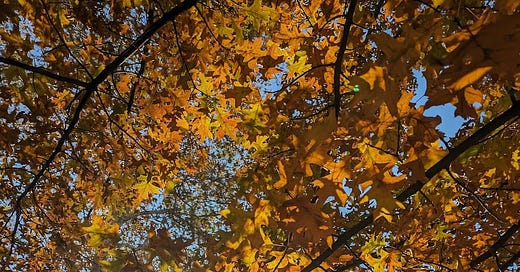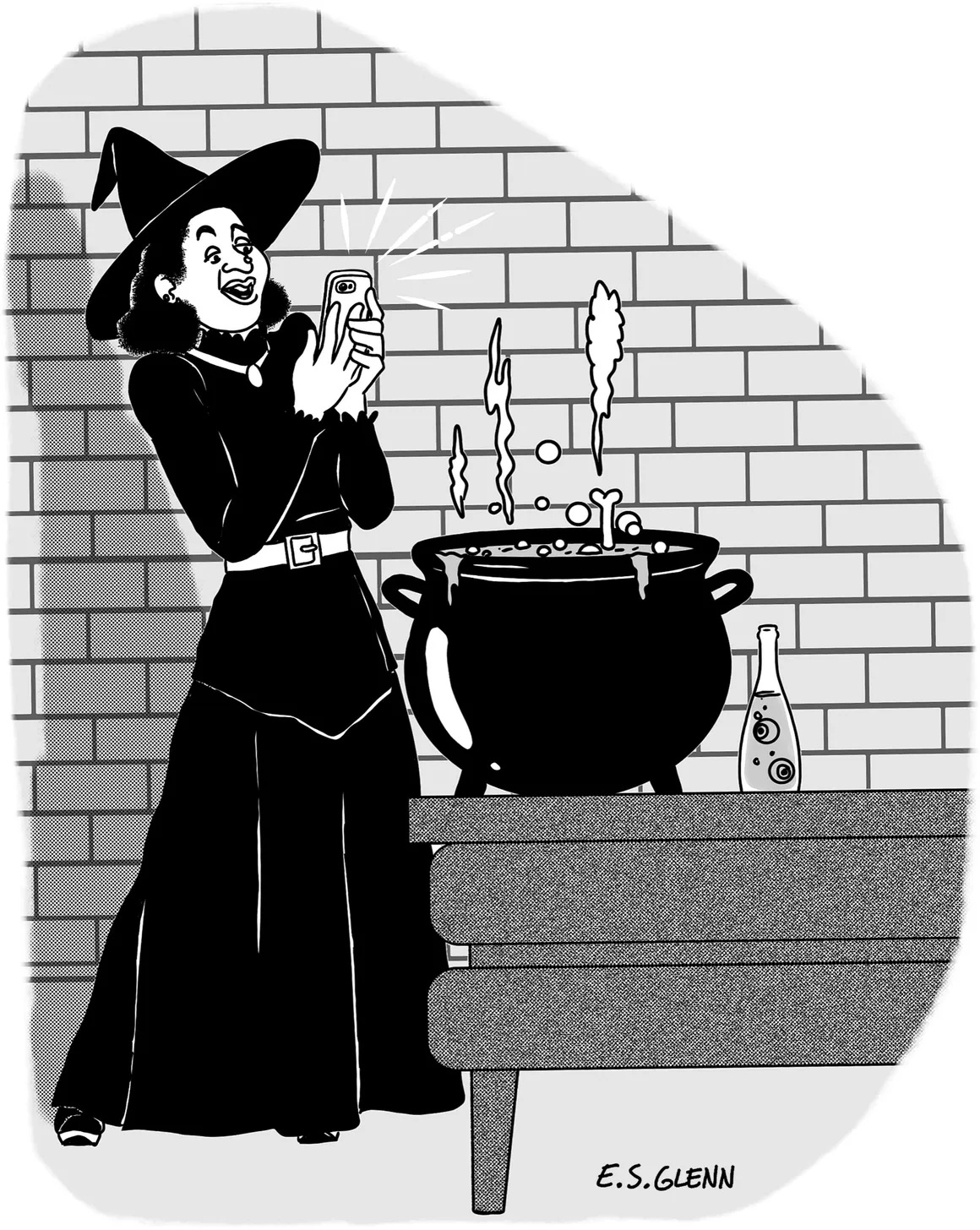Hi friends.
Whew, it’s been a rough week. Although not without some effervescent moments of sweetness, joy, and purpose, all under those sunny fall skies where the blueness completes a full-rainbow spectrum with the green, yellow, orange, red and brown leaves.
I went to a public memorial for a community member killed in the October 7th attacks; you can donate to support his unborn child here. We also took one of our kids to a child-friendly ceasefire march. And I had an organizing meeting with fellow parents who are joining a citywide coalition to push for faster decarbonization of public schools; Brooklynites can sign our petition here.
See what I mean? Full spectrum.
I beg you all to take care of yourselves, and not spend too much time scrolling on your phones. (OK, mom!)
I’ve been plunged in reporting on the personal toll the war is taking on New Yorkers. My first piece was about what mothers are telling their children. Then I started talking to high school students.
These teenagers, who came from all over the city and a range of socioeconomic backgrounds, really impressed me with their thoughtfulness and reflectiveness. In their willingness to tolerate other points of view, to understand and consider the limitations of information they’re taking in, and to not be so reactive as to destroy personal relationships over a political conflict, they compared very favorably, not only to the adults I interviewed, but to the adults I’ve been seeing and hearing immediately around me.
I’ll give three examples that didn’t make it into the forthcoming published story for lack of space.
Satchel
He was one of the high school student organizers of the pro-ceasefire student walkout that happened November 9th. He is Black, with family roots in the Caribbean; he has both Palestinian and Jewish friends.
And right after the attacks, one of his Jewish friends called him out.
“I made a very inflammatory comment online: ‘all my homies hate Israel’. [this is an Internet meme.] And she kind of said, we should reexamine our language. They did just suffer a terrorist attack and people are sensitive.”
And you know what happened then?
“She corrected me and we moved on.”
That’s right. He didn’t double down, he didn’t flame his friend or block her. In fact, he asserts his right to still be learning, even as he’s speaking up for what he believes in.
“I don’t think we have to know everything when an issue has been lasting damn near 80 years. You can make mistakes; it’s the community’s job to correct those mistakes. And there are also things you can do to educate yourself.”
This idea of learning in public with the help of your community, really rhymes to me with some of the idealism of the early Internet. In my book DIY U, in 2010, I talked about how “how to” is one of the most common opening phrases for an online search, and how people flock to sites like Wikipedia, Youtube, Reddit and StackOverflow to learn and teach each other.
I don’t necessarily believe in the myth of the digital native, the idea that because someone was born in the 21st century they magically have a better grasp of all digital technology. But it does sure feel like some teens have developed a little bit of collective immunity to the poisoned waters of social media in which we all swim.
Chloe
Is a 17 year old senior and leader of the Jewish club at her school. Her empathy and maturity on this very point made my jaw drop.
“When I see someone post something I don’t agree with— although I have that urge to unfollow, cut them off, block them, swipe up, go off—I also understand that they’re also learning, they’re also young. It’s not necessarily them being against me, or pro hate.” She and her fellow student leaders in the Muslim culture club and the school’s diversity and inclusion leadership are doing their best to create structured spaces for both reflection and learning, understanding that the nuances of the situation are hard to walk online or even in a brief face-to-face conversation.
How might your online and in-person interactions change if you said to yourself “This person is also learning”? Or, just as true given the current situation, “This person is also in pain as they struggle to comprehend what is happening?”
Cara
In her 20s, Cara is the granddaughter of a Holocaust survivor who was raised Zionist and now calls herself an anti-Zionist. While the current conflict puts her at odds with her family, she recognizes what they also have in common: “Everyone is grieving.”
For her parents and cousins, the October 7th attacks raised up their shared ancestral trauma; for her, the images of rubble in Gaza raise it even more.
“My grandparents survived the Warsaw Ghetto, which was completely destroyed after the uprising in 1943, and my grandfather built a bunker with his brother under the rubble. Having heard the story so many times, seeing the pictures of the rubble in Gaza, and just knowing that they are in a similar position— there’s no food, water, fuel, it’s a total blockade and siege—really brings it to the forefront for me.”
My rabbi, Amichai Lau-Lavie, has been saying from the beginning that this war is a tragic kind of family quarrel.
And for some that’s literally true. But Care told me she’s hopeful.
“Interpersonal conflict can be productive, I think. We’ll see what happens in terms of my family conversations, but I hope it’s generative. [This conflict] was always under the surface. It was going to come up intensely at some point. It’s important to have disagreements and still be in loving relationships.”
I’m just — wow. More of that energy in my life, please.
Some links
Alex Steffen on the fifth international Climate Assessment
Sari Bashi on Chris Hayes’ podcast — especially the part where she says everyone in Gaza, like her own mother in law, should have the right to return to the areas they left behind 75 years ago in what is now Israel, and Chris basically snorts “there’s literally no political will for that,” and she says “I very much take on the responsibility of continuing to say uncomfortable truths. And I don’t think people are going to listen any time soon but I can’t stop saying uncomfortable truths.”
How time in nature can reduce loneliness
Christiana Figueres on Ecological Hope, and Spiritual Evolution “I thought, “Okay, if I as a mother have received from my parents a planet that had X number of species in it, and now I am turning over a planet diminished with less species to my two daughters, how can that be a responsible term of reference of any mother or any parent?”
… “my sense is that climate change is the gym in which we as human beings are strengthening our muscle to be able to evolve to a much higher sense of awareness, consciousness, action, than we were before. And that the way that we understand that is measured in the way that we understand our relationship with nature.”








